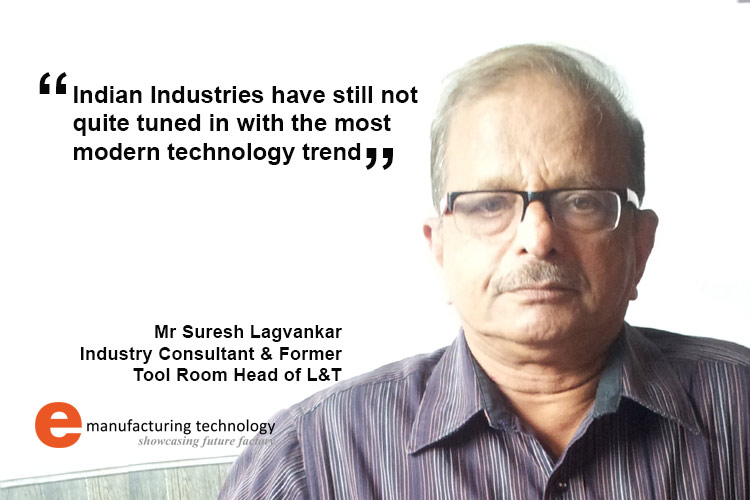Let Technology Overtake the Manual Process” Suresh Lagvankar, Industry Consultant & Former Tool Room Head of L&T
Current Scenarios
Globalisation helped India create its place on the vast canvas of advanced technology. Most of us were dazed to witness the technologies which were not until within our reach. Manufacturing sector in particular has experienced a qualitative change. When we were exposed to new concepts of quality, productivity standards and safety norms of the western world, we realised how archaic our perceptions had been, about these concepts.
Today we think that India has reached a lot closer to the advanced engineering practices. How true is that? The question makes us reflective. Its sincere answer reveals the stark difference between the modern technology adopted by the western world and the kind version that we generally adopt in India. Industry experts also believe most of the Indian industries have still not quite tuned in with the most modern technology trend.
“Let technology overtake manual process”
We definitely need to minimise the manual process since it is error prone and does not guarantee constant results. But most of us connect everything with the input cost. We think too much of commercial implications. Our tendency is to look for the lowest input cost option. At several Indian business houses, the modernisation drive is consigned to back burner because of financial implications with high custom duty etc. In many cases, the machine tool or equipment is not looked upon from the performance and productivity point of view. It is more heavily weighed from its cost, so the quality is compromised. Management should be enthusiastic for productive, innovative, reliable and precision equipment which is capable to compete in the world market.
India’s & technology adoption
Today we have very few Indian companies, who have a global face value in true sense. They are the ones who have started taking strategic steps to adopt the latest high-end technology from western world. Such managements believe that unless they have progressive mind and vision towards complete modernization they will not be able to deliver at the global stage in terms of quality, speed and cost. So, to certain extent the trend is encouraging.
But still many other companies are confining their vision on the cost. They are looking for low cost technology, which is abundantly available in Chinese or Taiwanese market. These entrepreneurs are apprehensive about huge capital investment in world-class technology because of the fear factor – the fear of failure. Fear is the biggest hurdle in being innovative. That’s why design or product up-gradation does not take place at times.
In some cases the advance technology is adopted in haphazard manner. For instance, the management invests big amount on installing advanced CNC machine, but doesn’t spend on world-class quality tooling. The low quality tool affects on machine spindle and product finish. As a result company has to incur repetitive cost on buying the tooling.
What needs to be done?
The chronic problem that the Indian industry has been facing is the ‘chalta hein’ attitude. It reflects in almost all the operations and at every level. This is why we see lack of accountability. Once this attitude is built up it is very difficult for an industry to shrug it off. It is therefore, essential to nip it from the bud i.e while imparting training to apprentices and engineers. At ITI level, the apprentices who are under vocational training courses should be aware of the skill requirement. Even the century old machines have to be replaced with new ones. Sense of accountability must be inculcated in their minds during this stage. At present many instructors in various ITI’s are less experienced and lack passion for imparting training and developing skilled craftsmen. They can take help of retired skilled employees from industries and their experience and knowledge can easily be transferred to apprentices. This will help the industries gain better trained craftsmen.
Companies that have set an example
Certain global technology leaders are making conscious efforts to change the conventional approach of Indian Corporate Houses. They are pushing only for real world-class technology by constantly trying to introduce the best, in terms of accuracy, efficiency and reliability.
In the recent times, some Indian companies like L&T, Mahindra, TATA and the likes, who have acquired global presence in true sense have taken best efforts to come out of the conventional thinking. They have not only have adopted to the best technology, but with commitment and consistency they have significantly changed the perception and work culture at their work places. Their TQM, KAIZEN, 6 Sigma and 5S or similar other campaigns are not launched for academic record but to bring all-round progress. These companies have also done exemplary work on power saving, non-conventional energy resources, environment preservation and house-keeping etc. They have been able to keep their workforce committed and passionate about their work. If this type progressive approach is adopted by all industries and their vendors with the Government’s good support, India will be on fast track to full-fill the dream of “MAKE in INDIA”.


